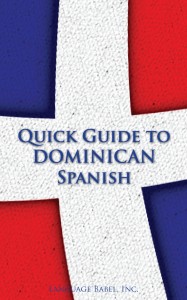This slang term does not exist in Spanish. Please revise the term. Examples
¡anjá¡
An interjection used to express surprise, disbelief, or sarcasm. Similar to 'Oh really?' or 'Is that so?' in English. Examples Spanish: ¿Así que ganaste la lotería? ¡Anjá! English: So you won the lottery? Oh really!
¡cojollo!
An expression of surprise, shock, or amazement, similar to 'wow!' or 'damn!' in English. Examples Spanish: ¡Cojollo! ¿De verdad ganaste la lotería? English: Damn! Did you really win the lottery?
¡miélquina!
A term used in some regions of Spain, specifically in Murcia. It's a deformation of the expression 'mi alma', meaning 'my soul'. It's used to express surprise, disbelief, or admiration. Examples Spanish: ¡Miélquina!, ¿pero cómo has hecho eso? English: My goodness!, how did you do that?
Quick Guide to Dominican Spanish: A Book for Learning Spanish from the Dominican Republic
A Book for Learning Spanish from the Dominican Republic with more than 500 Spanish words translated to English to learn Dominican Spanish vocabulary. Spanish vocabulary changes significantly from one country to the next. Yet, few people learn about this until they are in a country, stumbling through the local Spanish slang.
sirimba
A term used in some Latin American countries to refer to a hangover or the state of being very tired, especially after a night of heavy drinking. Examples Spanish: Después de la fiesta de anoche, amanecí con una sirimba terrible. English: After last night's party, I woke up with a terrible hangover.
jeepeta
Jeepeta is a slang term commonly used in the Dominican Republic to refer to a large, luxurious SUV. Examples Spanish: Me gusta tu nueva jeepeta, se ve muy elegante. English: I like your new SUV, it looks very elegant.
chichigua
In certain regions of Latin America, 'chichigua' is a slang term used to refer to a 'kite'. This term is more commonly used in countries like the Dominican Republic. Examples Spanish: Vamos al parque a volar la chichigua. English: Let's go to the park to fly the kite.
concón
In Dominican Spanish slang, 'concón' refers to the crispy rice at the bottom of the pot. Examples Spanish: Mi parte favorita del arroz es el concón. English: My favorite part of the rice is the crispy bottom.
bufear, bufeo
A slang term primarily used in Spain, 'bufear' or 'bufeo' refers to the act of ignoring someone, avoiding contact or giving the cold shoulder. Examples Spanish: No entiendo por qué me está bufando, si no le he hecho nada. English: I don't understand why she is ignoring me, if I haven't done anything to her.
tiguere
In Dominican slang, 'tiguere' is used to describe a person who is cunning, street-smart, and often involved in tricky or shady activities. It can also be used for a person who is very active, restless, or aggressive. Examples Spanish: No confíes en ese hombre, es un tiguere. English: Don't trust that man, he's a cunning […]
ajumao
A term used in some Latin American countries to refer to a person who is drunk or intoxicated. Examples Spanish: Después de la fiesta, todos estaban ajumaos. English: After the party, everyone was drunk.
abur
An abbreviation of the word 'aburrido' that is used to express boredom or annoyance. It is mostly used by teenagers and young adults. Examples Spanish: ¡Abur! Este libro es muy tedioso. English: Boring! This book is very tedious.
toto
In some Spanish-speaking regions, 'toto' is a slang term often used to refer to female genitalia. It's considered vulgar and not appropriate for formal or polite conversation. Examples Spanish: Ese tipo es tan grosero, siempre hablando de toto en público. English: That guy is so rude, always talking about 'toto' in public.
